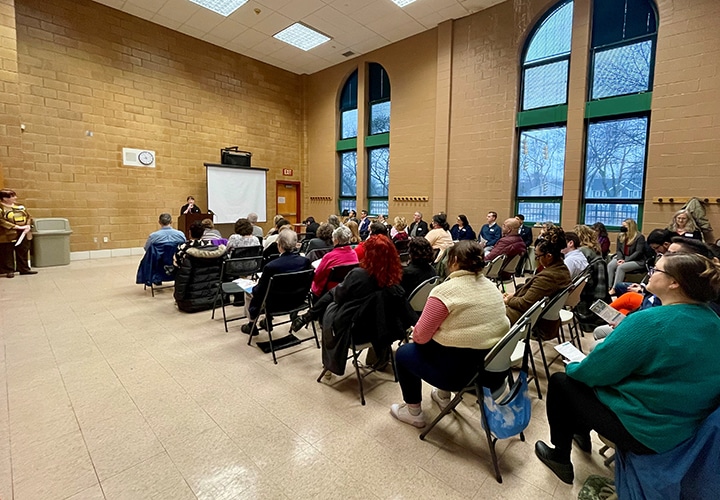Nicole Daviau, the director of the Porter Memorial Library in Blandford and president of the Western Mass Library Advocates, spoke to the needs for more local library state funding before a Legislative Breakfast at the Brightwood Library Branch on Feb. 23.
Reminder Publishing photo by Bill Zito
SPRINGFIELD — The Brightwood Library Branch was host to one of four Legislative Breakfast events focused on library advocacy and supportive legislation across the commonwealth.
Library officials and advocacy groups joined state and local leaders on Feb. 23 speaking on behalf of House Bill 3239 which supports easier access to audio and electronic books and materials.
Similar gatherings took place in Greenfield, Williamstown and Agawam over the months of January and February.
State Sens. Jake Oliveira (D-Ludlow) and Adam Gomez (D-Springfield) affirmed their support for libraries throughout Western Massachusetts and improved funding to provide materials and improvements through increased legislation, including line items calling for proposed increases for several programs and group initiatives, including aid for state and regional libraries, technology and resources sharing, talking book programs and advocacy organizations.
Executive Director Jeannette Lundgren from the Central/Western Massachusetts Automated Resource Sharing Service Area, better known as CW Mars, spoke to their 150-member libraries and their continued efforts to bring smaller locations on board, joining their two largest libraries in Worcester and Springfield.
Over the past five years, she noted CW Mars has added 15 libraries to their group to allow for greater resource sharing, continued training for library staff and organized support.
“Our mission is to promote the sharing of library resources through technology,” Lundgren said, referencing a line item in legislation seeking additional funding for technology and resource sharing.
Lundgren also advocated for increased accessibility to libraries and their resources stating that improved internet connectivity, increased internet speeds, online availability and the elimination of overdue fines remain part CW Mars goals in clearing pathways toward library access.
“Currently 92% of all of our public libraries do not charge overdue fines,” she said.
Nicole Daviau, director of the Porter Memorial Library in Blandford and president of the Western Mass Library Advocates, spoke specifically to increased state support for local public libraries as outlined in another line item.
Daviau referred to her own library in Blandford, with a population of approximately 1,200, is a one room library of less than 1,200 square feet and an occupancy limit of 25 persons.
The library, built in 1892, secured a grant to build patio space, with rising construction costs and state aid played a crucial role in allowing them to fund the project.
The small library is also installing after hours book pick-up lockers, to facilitate patron access to requested materials even after the building has closed.
“State aid funding is making it possible for us to remove these barriers to access library services,” she said.
Western Mass Library Advocates also seeks state aid to assist in providing networking and educational opportunities for librarians and to help local libraries provide summer funding programs, make building improvements and effect technology upgrades.
One library, she said, is using similar funding to hire extermination services to tackle a building rat problem.
“This year’s legislative agenda is building a stronger commonwealth one person at a time,” Daviau said. “Massachusetts libraries embody this message, we work together and strengthen every community and every person in our commonwealth by fostering individual growth through providing free access to books, information and a safe place.”
Vicky Biancolo, vice chair of the Massachusetts Board of Library Commissioners, addressed the challenges libraries face with the purchases and lending of eBooks, audiobooks and similar content.
Biancolo highlighted what she referred to as “predatory pricing” for libraries when it comes to these materials. Explaining the differences between the purchase of an eBook or audiobook by an individual as opposed to a library, she outlined an eBook or audiobook is not purchased the same way, and an individual pays for the book, a library pays to license the material.
“Licenses have limits,” Biancolo said. “Libraries cannot license eBooks and audiobooks through the same channels that individuals can, we have to go through library markets and publishers often charge libraries triple or more what a consumer would pay for the same eContent with even more restrictive licenses.”
She also said there is a great disparity in pricing where an audiobook costing $15 for an individual could cost $130 for a two-year license that would require renewal at the same price.
In the same light, a physical book purchased by a library belongs to that library outright and can be loaned out as many times as it remains usable or relevant.
Current legislation also seeks protections and attention regarding book and content challenges and easier access to stated funding.
The legislative agenda and additional details can be found at mblc.state.ma.us.


